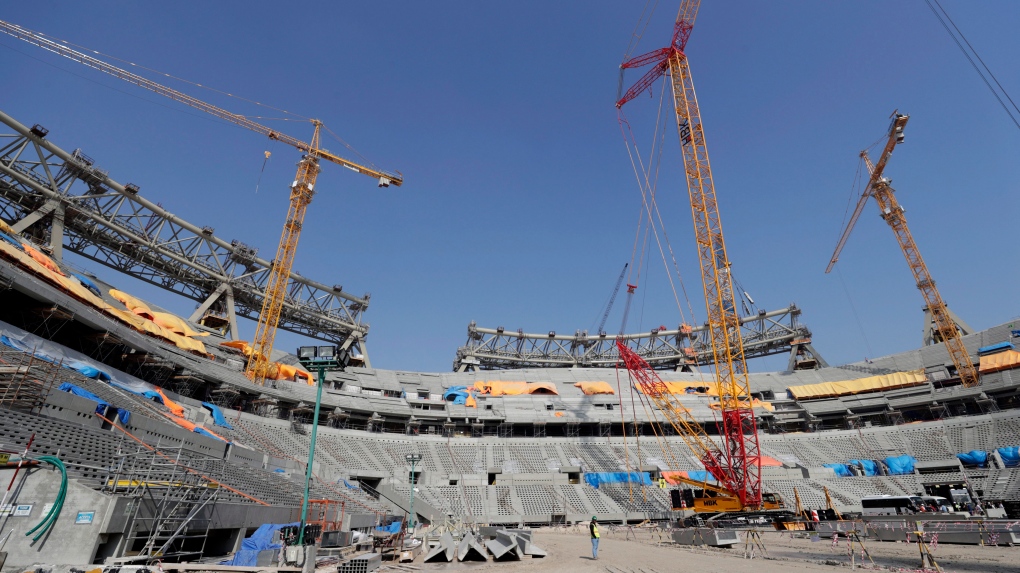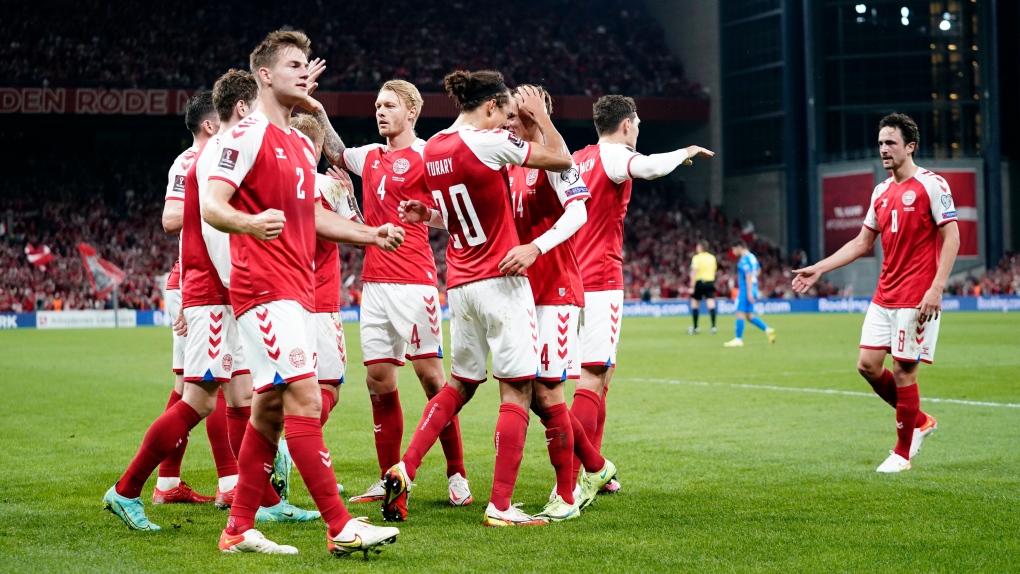
'I am angry': Alberta farmers will continue fight over world class motorsport resort
The rolling hills leading to the hamlet of Rosebud are dotted with sprawling farms and cattle pastures -- and a sign sporting a simple message: No Race Track.
The world’s biggest sporting event, the FIFA World Cup, is set to take centre stage over the next four-plus weeks but this edition looks set to be the most controversial.
From bribery accusations in the bid process, to horrific worker conditions and despicable human rights laws, this marks a new low for the already cellar-dwelling ethical standards FIFA has set over the years.
Plenty of good soccer will be played beginning Nov. 20 and there will be a winner on Dec. 18, but everything happening off the pitch – or not being allowed to happen off the pitch – will be grabbing just as many headlines.
Eleven players on a pitch, so here’s 11 things to know for this tournament:
With Qatar having been awarded hosting right, their summers were deemed too hot and the soccer world has been turned on its head to accommodate playing this tournament through November and December.
Normally, the European league calendar would be thriving at this time but have instead come to a halt until Christmas at the earliest.
It will still be quite hot in Qatar at this time and so all eight of the stadiums to be used are fully air-conditioned in another first for a World Cup.
This tournament wouldn’t have been possible without the workers who constructed the stadiums, and they have sadly been forced to cope with a host of violations from illegal recruitment practices to nationality-based discrimination to inhumane living and working conditions.
A subsidiary of French construction company Vinci was handed preliminary charges on Nov. 9 of forced labour and other alleged violations of the rights of migrant workers. The company denies the charges and is appealing them.
 Workers work at Lusail Stadium, one of the 2022 World Cup stadiums, in Lusail, Qatar, Friday, Dec. 20, 2019. Construction is underway to complete Lusail's 80,000-seat venue for the opening game and final in a city that didn't exist when Qatar won the FIFA vote in 2010. (AP Photo/Hassan Ammar)
Workers work at Lusail Stadium, one of the 2022 World Cup stadiums, in Lusail, Qatar, Friday, Dec. 20, 2019. Construction is underway to complete Lusail's 80,000-seat venue for the opening game and final in a city that didn't exist when Qatar won the FIFA vote in 2010. (AP Photo/Hassan Ammar)
Analysis by The Guardian revealed that a shocking total of at least 6,500 migrant workers from India, Pakistan, Nepal, Bangladesh, and Sri Lanka have died in Qatar since it won hosting rights over a decade ago. The number would be even higher if it were to include data from several other countries including the Philippines and Kenya that also sent large numbers.
There are also many fans who are either going to Qatar with some level of apprehension or boycotting completely because of the country’s laws that impact the LGBTQ2S+ community.
Khalid Salman, a Qatar World Cup ambassador, set off a firestorm on Nov. 8 when he described homosexuality as a “damage in the mind" during an interview with a TV channel in Germany.
Ten national soccer associations – all from Europe – challenged FIFA to ensure the advancement of worker rights in Qatar in a letter.
Denmark had a request to wear training shirts with a message of “Human Rights for All” during the tournament rejected by FIFA on the grounds that political messages on shirts aren’t permitted. The Danes will however wear “toned down” jerseys where the country badge will hardly be visible.
 Denmark celebrate after scoring during the World Cup 2022, group F, qualifying soccer match between Denmark and Israel in the Park in Copenhagen, Tuesday, Sept. 7, 2021. (Mads Claus Rasmussen/Ritzau Scanpix via AP)
Denmark celebrate after scoring during the World Cup 2022, group F, qualifying soccer match between Denmark and Israel in the Park in Copenhagen, Tuesday, Sept. 7, 2021. (Mads Claus Rasmussen/Ritzau Scanpix via AP)
The Dutch World Cup squad intends on meeting with a group of migrant workers in Qatar, with head coach Louis van Gaal saying, “First of all, we are going to Qatar to become world champions, but of course, we look beyond football.”
The Iranian team has enough to worry about on the pitch in a group with England, Wales, and the U.S., but how they show their opposition for the mistreatment of women back home will surely grab some attention.
There have been protests across Iran and around the world following the death of 22-year-old Mahsa Amini in September with an Iranian court even recently issuing the first death sentence linked to the protests
National team head coach Carlos Queiroz recently said that the players are free to join in the protests while they are playing at the tournament as long as it is done within the rules of the tournament.
BTS’s Jung Kook, The Black Eyed Peas, and Shakira – who also performed in 2010 – are among those who have agreed to be part of the opening ceremony act but there are a few celebrities who turned down opportunities in Qatar because of their abhorrent human rights standards.
Dua Lipa recently took to their Instagram story to squash rumours that she was performing and called out Qatar in the process.
“I will be cheering England on from afar and I look forward to visiting Qatar when it has fulfilled all the human rights pledges it made when it won the right to host the World Cup,” she said in an IG story.
Rod Stewart turned down a million-dollar offer to perform in Qatar nearly 15 months ago because he, too, felt strongly about the same issues.
It is an offence in Qatar, a majority-Muslim emirate, to drink or be drunk in public spaces and so the country has assigned specific areas where the sale of alcohol will be permitted.
There are also designated areas where drunk people will be allowed to sober up.
Qatari organizers on Monday ordered Budweiser to move its beer stands at eight of the World Cup venues to less visible areas.
OK, let’s get to what’s happening on the pitch. Brazil is the betting favourite to win the tournament, currently ranked No. 1 in the world and the holder of the most men’s World Cup titles with five, they haven’t gone the distance since 2002. That was also the last time a non-European country won it all.
Following them in the betting odds are Argentina and defending champions France.
They have undoubtedly been the two best players for over a decade and with Argentina’s Lionel Messi now at 35 and Portugal’s Cristiano Ronaldo turning 38 in three months, this is more than likely the last we see of these two icons of the game.
While Argentina enter as one of the favourites, Portugal face what could be a tricky group alongside Uruguay, Ghana, and South Korea.
Other great players of the past decade likely making their final appearance at soccer’s biggest stage include France’s Karim Benzema, Poland’s Robert Lewandowski, Wales’ Gareth Bale, and the Uruguayan duo of Luis Suarez and Edinson Cavani.
This isn’t a video game where injuries can be turned off and unfortunately there are some big names who will be absent from the world’s biggest stage.
Both Paul Pogba and N’golo Kante were instrumental in France lifting the trophy in 2018 but will be missing this time around. England’s Reece James would have been picked as a player who could make a global name for himself in Qatar but he has been ruled out due to a knee injury. Senegal picked star man Sadio Mane in their squad but he faces a race against time to be fit for any of their matches.
Other players set to miss out due to injury include Germany’s Timo Werner and Marco Reus, Portugal’s Diogo Jota, and Netherlands’ Georgino Wijnaldum.
Global superstars like Egypt’s Mohamed Salah and Norway’s Erling Haaland will miss the tournament as their respective countries failed to qualify and on that note, it’s worth reminding that reigning European champions Italy shockingly failed to qualify for this tournament.
In case you haven’t heard, Canada has qualified for the men’s FIFA World Cup for the first time in 36 years. They didn’t sneak in through the backdoor, either, finishing atop their qualifying group ahead of the likes of Mexico – a team that perennially makes the Round of 16 – and the U.S. Canada also scored the most goals while allowing the fewest over the course of their campaign.
With files from The Associated Press

The rolling hills leading to the hamlet of Rosebud are dotted with sprawling farms and cattle pastures -- and a sign sporting a simple message: No Race Track.
Dozens of Ontarians are expressing frustration in the province’s health-care system after their family doctors either dropped them as patients or threatened to after they sought urgent care elsewhere.
For decades, North Bay, Ontario's water supply has harboured chemicals associated with liver and developmental issues, cancer and complications with pregnancy. It's far from the only city with that problem.
A man who tried to access Drake’s Bridle Path mansion earlier this week returned to the property Saturday and was apprehended again for allegedly trespassing, Toronto police say.
Multiple people at the protest camp torn down at the University of Alberta campus Saturday say police's actions against protesters were "violent" and "disproportionate."
When West Virginia Republicans vote in Tuesday's primary, they will have a hard time finding a major candidate on the ballot in any statewide race who openly acknowledges that U.S. President Joe Biden won the 2020 election.
Amazon's paid subscription service provides free delivery for online shopping across Canada except for remote locations, the company said in an email. While customers in Iqaluit qualify for the offer, all other communities in Nunavut are excluded.
Two daughters and a mother were reunited online 40 years later thanks to a DNA kit and a Zoom connection despite living on three separate continents and speaking different languages.
U.S. President Joe Biden on Saturday called Donald Trump “clearly unhinged” and claimed that “something snapped” in the former president after he lost the 2020 election.

A family of fifth generation farmers from Ituna, Sask. are trying to find answers after discovering several strange objects lying on their land.
A Listowel, Ont. man, drafted by the Hamilton Tigercats last week, is also getting looks from the NFL, despite only playing 27 games of football in his life.
The threat of zebra mussels has prompted the federal government to temporarily ban watercraft from a Manitoba lake popular with tourists.
A small Ajax dessert shop that recently received a glowing review from celebrity food critic Keith Lee is being forced to move after a zoning complaint was made following the social media influencer’s visit last month.
The Canada Science and Technology Museum is inviting visitors to explore their poop. A new exhibition opens at the Ottawa museum on Friday called, 'Oh Crap! Rethinking human waste.'
The Regina Police Service says it is the first in Saskatchewan and possibly Canada to implement new technology in its detention facility that will offer real-time monitoring of detainees’ vital health metrics.
Just as she had feared, a restaurant owner from eastern Quebec who visited Montreal had her SUV stolen, but says it was all thanks to the kindness of strangers on the internet — not the police — that she got it back.
The stakes have been set for a bet between Vancouver and Edmonton's mayors on who will win Round 2 of the Stanley Cup playoffs.
A grieving mother is hosting a helmet drive in the hopes of protecting children on Manitoba First Nations from a similar tragedy that killed her daughter.